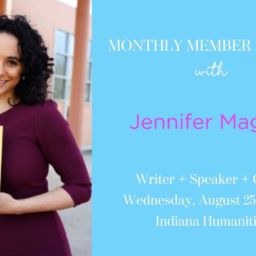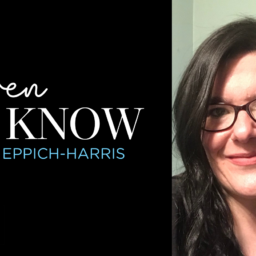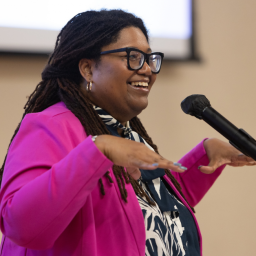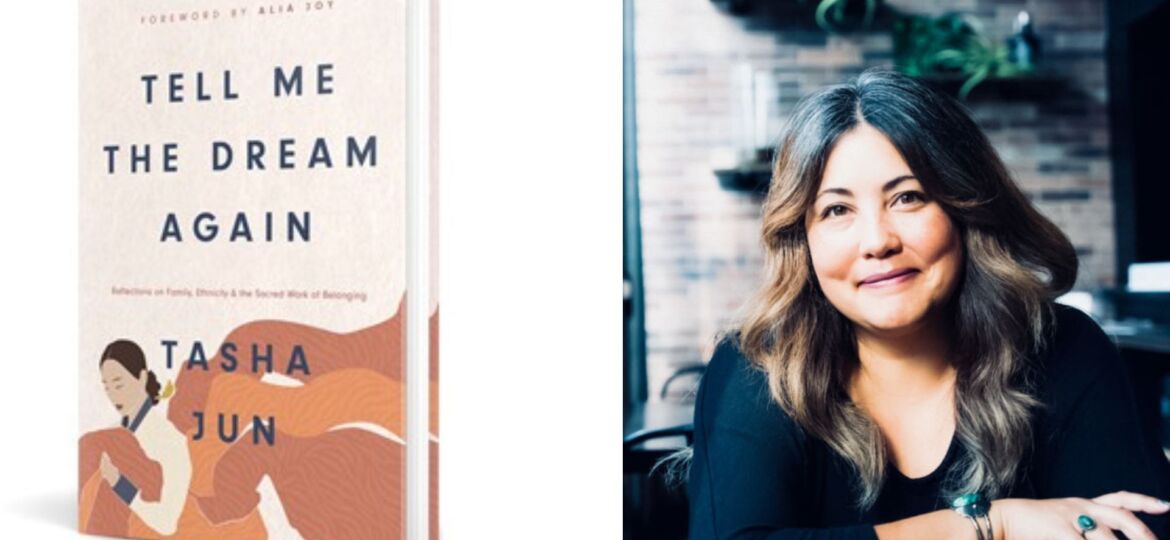
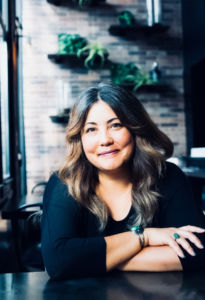
Throughout the pandemic, there was a rise in anti-Asian hate and violence. It was so painful to read about elders and others from our diverse communities attacked on the streets, and it was another layer of pain to experience the silence surrounding it all. More recently, learning that “Ching Chong” songs are still alive and well on my own Asian American kids’ school busses and playgrounds right alongside college campuses in our state where Purdue’s chancellor openly mocked Asian languages on stage. Reading about my alma mater not even being a safe place to ride the bus as an Asian American has been heartbreaking. Throughout the history of our time here in the U.S., if we’ve been seen at all, we’ve been seen as a monolithic scapegoat or a model minority. Both stereotypes are myths. Both bring devastating harm.
This is why we need to tell our own stories as Asian Americans and Pacific Islanders and let them take up space (in us and in our communities, cities, and nation). Our stories are needed this May, and every other month of the year. Our history is American history. Our stories belong.
My own story as a biracial Korean American is one of hiding, assimilation, rejection, and now, one of learning to grieve what was lost and live embracing all of who I am.
***
She stood at the kitchen stove, leaning on her right leg. Her tiny left foot rested sideways against her right knee, her leg lifted to resemble a triangle. Her back was toward me, bent over a steaming pot. She dipped a burnt-tipped wooden cooking spoon into the pot, tasting the broth every few minutes.
Growing up, I watched her stand at kitchen counters like this in every house we lived in. She ate leftover rice mixed into cold water for breakfast, with an open glass jar of kimchi nearby. She made ice-cold nangmyeon throughout the summer and then made sujebi, soon- dubu, doenjang, and kimchi jjigae in the colder months. She was always making something during the day, and she rarely sat down.
As a girl, I watched her stir, spoon, and slurp. When I was young, I often requested two simple Korean soups: tteokguk filled with chewy rice cakes (my favorite) and muguk filled with sweet radishes. I was reluctant about most of the other dishes, especially the seaweed soup that resembled a bowl of the ocean, with wet rectangles of seaweed that stuck to my spoon and tongue the way it wrapped around my legs in the ocean. There was something claustrophobic about it—a fear that I wouldn’t be able to untangle myself from this plant of the sea. And if I couldn’t untangle myself, if I lost control, where would this seaweed and the current it swam in end up bringing me?
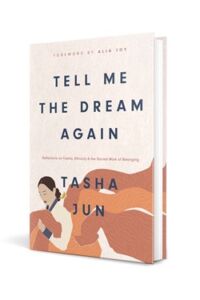 When my mom stood over these pots of spicy stew and earth-colored broth, I knew she was remembering. Her mind was elsewhere, and memories I didn’t know or understand were being stirred up alongside the softening vegetables.
When my mom stood over these pots of spicy stew and earth-colored broth, I knew she was remembering. Her mind was elsewhere, and memories I didn’t know or understand were being stirred up alongside the softening vegetables.
I often turned away her offered spoonful with a scrunched-up nose and an unyielding “No, thanks.” I tried to ignore the fact that I was refusing more than a taste of soup. I told myself it was okay if I’d rather eat chicken noodle like the other kids. I told myself it was only a matter of taste and preference, nothing more.
Right after our first son was born, my parents came to visit and help us transition into parenthood. On their last day with us, my mom stood at our stove over a huge pot making seaweed soup. She stood on one leg, as she always did, and I was a child again.
Peeking under the lid of the pot, my mom rambled on at me from the kitchen of our open-layout apartment while I nursed my son on the couch. She told me how important it was for me to eat this particular soup.
“All Korean women eat it after giving birth,” she said. “I didn’t teach you enough.”
Then she insisted on having me try some while she walked across the room with a spoonful. She gently shoved it into my mouth while I tried to make sure none of it dripped onto my newborn son’s face.
She raised an eyebrow as if to say, “See? You need it. I’m right.” She looked at me, waiting for a response. I nodded, holding my eyes steady so they wouldn’t roll into the back of my head, and she returned to the kitchen with the dripping spoon.
She retrieved another spoonful and shoved it into my dad’s mouth while he stood next to her. She stirred the pot once more and said to me, “Finish the whole pot when you done feeding.”
I was hormonal and tired, and even though I told her I’d eat it once she was gone, I didn’t. I took a few tiny spoonfuls and then poured the rest down the kitchen sink. My son watched from his bouncy seat beside me as the liquid flowed down the drain like a disappearing waterfall.
Almost a year later, I was in a bookstore pushing my son around in his stroller while he fisted Cheerios, and I stopped in the international cookbook aisle. I found a beautiful front-facing hardcover Turkish cookbook and then spotted a thin paperback Korean cookbook beside it, as if it were hiding.
I pulled it out and found an inviting picture of noodles with perfectly placed vegetables on the cover. I flipped through a few pages, and then there it was: seaweed soup. I began reading the author’s description about the Korean tradition of giving new mothers this special healing soup. For thousands of years, Korean mothers have made miyeokguk for their Korean daughters when they become mothers. When I became a mother, I dumped mine down the drain.
Standing in the busy Barnes & Noble aisle, clutching book pages in my hand to keep them open to the seaweed soup spread, I cried like a baby, right onto the page. I bought the book I’d ruined with my tears—tears that finally fell over all the years of rejection.
Adapted from Tell Me the Dream Again: Reflections on Family, Ethnicity, and the Sacred Work of Belonging by Tasha Jun. Copyright © 2023. Used by permission of Tyndale House Publishers, a Division of Tyndale House Ministries. All rights reserved.
Tasha is a Korean American melancholy dreamer, wife, and mom, who grew up in a multicultural and biracial home. She’s spent her life navigating liminal space. Writing has always been the way God has led her through the ache and towards the hope of shalom. Her debut book, Tell Me the Dream Again: Reflections on Family, and the Sacred Work of Belonging is available for order now (released May 9, 2023), wherever books are sold. Find more of her writing here.
All of our content—including this article—is completely free. However, we’d love it if you would please consider supporting our journalism with an Indy Maven membership.










